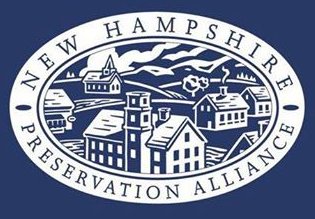Five Keys for Success in Preserving Community Anchors in Historic Buildings
Newport’s Richards Library, Swanzey’s Mt. Caesar Union Library Receive Grants from NH Preservation Alliance and The 1772 Foundation
Library associations in Newport and Swanzey are preserving their historic buildings assisted by grants from the NH Preservation Alliance in partnership with The 1772 Foundation. The Richards Free Library in Newport and the Mt. Caesar Union Library in Swanzey have received funding to support much-needed repairs to significant features of their historic buildings.
Richards Free Library in Newport is using its grant to complete restoration of its dormers as part of an ongoing commitment to preserving their 19th century building and meeting the library and program needs of the greater Newport community.
Libraries, town halls, and schools are often referred to as “community anchors.” These venerable institutions, typically supported by municipal budgets, are often housed in historic buildings. Whether they’ve occupied those buildings for decades or taken over after a previous occupant, they are often balancing the demands of their core mission with building maintenance or preservation challenges. By developing a sound incremental or phased approach to maintenance and repairs, essential operations can continue and building improvements can take place as time and funding permits.
Richards Free Library, established in 1888, occupies a National Register-listed, Classical Revival residence in downtown Newport, a historic mill town on the Sugar River near Sunapee. After a 2015 condition assessment revealed several major areas of concern, the Library Trustees made selected repairs utilizing endowment proceeds. The recent Preservation Alliance grant provided an additional $6,710 to complete the restoration of three iconic dormers that face Main Street, the final step in repairing all nine dormers. “The Richards Free Library provides 21st century library services and programs in a 19th century building,” said Andrea Thorpe, Library Director. “This grant will help us continue the preservation of this historic 1899 building, a focal point for the town common.”
The Mt. Caesar Union Library Association in Swanzey owns and operates a public library in a former private academy. The goals of their current capital campaign, which the Alliance grant will further, are to improve physical access to the building, enhance educational opportunities for students and homeschooling families, add space for community activities, and display historical artifacts.
A second grant from the Preservation Alliance in partnership with The 1772 Foundation was awarded to the Mt. Caesar Union Library Association in Swanzey, which owns and operates a public library in the former Mt. Caesar Union Academy. Built in 1843, it has been a private library since 1880 when the Academy closed. “The library has been at the center of Swanzey life for 175 years,” says Carolyn Noah from the Library Association. Several years ago, the Library received a NH Preservation Alliance grant to help fund a condition assessment with preservation guidelines. They also developed a strategic plan. With these two ingredients—knowing the costs to restore the building, and knowing where they wanted to be as an institution—then were ready to launch a capital campaign. Their goals were clear: improve physical access to the building, enhance educational opportunities for students and homeschooling families, add space for community activities, and launch a museum display for the collection of local antiquities currently stored in the basement.
Repair and restoration of the building’s fifty original double-hung windows became the first priority, and the Library Association is now on its way with the $10,000 grant it just received. “This is a great start on our fund-raising,” adds Noah, “When we finish, the improved energy efficiency will save us money in the long run.” Longer-range plans include renovating the main building’s second and third floors, building a second story over the 1980 addition, adding an elevator, providing accessible bathrooms, increasing the endowment, and installing solar panels to complement other energy-efficient measures. They’ve reached out to the community, involved kids in innovative programs, and are certain that there’s a need and a desire for what they plan to do.
Meredith is embarking on rehabilitation and expansion of its historic library, one of many other libraries around the state that are committed to expanding and upgrading their historic facility in its desirable downtown location.
Many other towns have completed “town anchor” rehabilitations too, often using similar incremental or phased approaches. Historic libraries in Conway, Greenfield, and Rye have expanded thanks to well-planned additions. The Meredith Library is embarking on an expansion and renovation project this year. Historic town halls in Gilmanton, Plymouth, Washington, and Wolfeboro have been successfully renovated to meet changing needs and requirements. Former schools have been converted to much-needed housing, with good examples in Portsmouth and Berlin. Another Alliance grant went to help fund the relocation of the long-vacant Gale School in Belmont, paving the ways for its rehabilitation and reuse.
Five things are key to successfully renovating or expanding community anchors in a historic building:
A building important to the community and deemed worthy of preserving.
A realistic funding plan, that may include an incremental or phased approach
A strong staff and/or volunteer teams to continue community services and take on management of the necessary renovation projects.
Diverse sources of support and funding, including partnerships and volunteer assistance.
Collaborative planning, patience, and frequent communication and outreach.
Don’t forget to support our work with a donation and be sure to follow us on social media!



